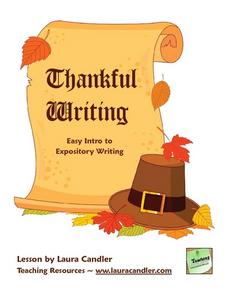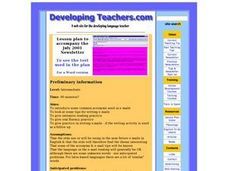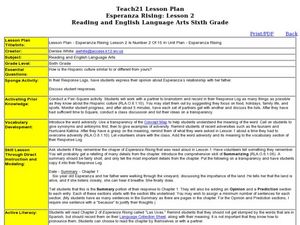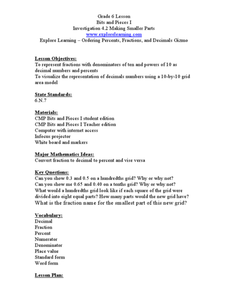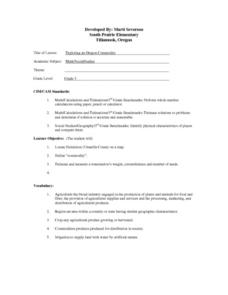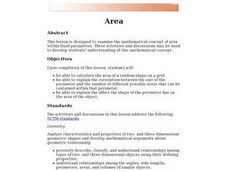Curated OER
Thankful Writing
Students go through the entire writing process to create an expository essay about what they are thankful for. They use graphic organizers to guide them through the process.
Curated OER
Figurative Language
Students create a PowerPoint show illustrating two types of figurative language. They demonstrate understanding of personification by creating and interpreting simple examples. They also demonstrate understanding of alliteration.
Curated OER
The Great Depression and Now: The Migrant Worker Experience
Students identify the concerns of people caught in desperate times during the Great Depression. They make connections between The Grapes of Wrath and historical images from the Great Depression. Students make connections between the...
Curated OER
Skin Cancer Prevention
Students discuss skin cancer prevention. For this skin cancer lesson, students read a pamphlet that tells the causes of skin cancer and what you can do to prevent it. Students will choose from a variety of projects which focus on skin...
Curated OER
National Sterotypes
Students develop their own ideas about the world around them. This lesson helps them improve their descriptive adjective vocabulary while they discuss perceived differences between nations through stereotypes.
Curated OER
Acronyms Used in E-mails
Learners examine some common acronyms used in e-mail and at how to write e-mail.
Curated OER
Esperanza Rising: Lesson 2
Sixth graders explore adversity. In this summarizing lesson students compare their culture to the Hispanic culture. Students reflect on a time they were met with adversity. Students summarize Chapter 1 of Esperanza Rising.
Curated OER
Reading and Writing in the Right Direction
Beginning writers practice writing and reading from left to right using green and red dots. You'll need notecards with a green dot on the left side and a red dot on the right side. Do your learners understand that print moves from left...
Southern Nevada Regional Professional Development Program
Common Core Reading Standards: Understanding Argument
What does your class know about logical fallacies? They can find out quite a bit and practice identifying logical fallacies if you follow the steps and use the resources provided here! After reviewing ethos, pathos, and logos, ask small...
Curated OER
Cell Game
Make a prototype of a game based on cell biology. Researching game design and working in groups to create a game will activate knowledge of cell biology. The review task will help students learning as they test out the games and their...
Curated OER
Literary Response and Analysis
Examine a variety of literary responses to Abraham Lincoln's death and the impact of perception. Your class can work in writing groups to analyze either poetry, eulogy, or a newspaper article. They retell the events of Abraham Lincoln's...
Poets.org
Ghosts and Spirits
Connect poetry to a naturally kid-friendly topic: ghosts! Draw on your class's prior knowledge of the paranormal to help them access the classic poem "Haunted House" by Henry Wadsworth Longfellow. After a fun warm-up activity describing...
Curated OER
Measure: Bearings and Scale Drawings
Young mathematicians practice measuring acurately with a protractor. They convert measurements using a scale factor, then translate the new information into diagrams. This lesson should be a hit in that it's mostly hands-on work with the...
Curated OER
Pilgrim Heritage and Ancestory
Students explore immigrants and immigration to the United States. They define and explain their definition of the term pilgrim. Students evaluate the goals of their ancestors as they arrived in America. Students research and design a...
Curated OER
Measure: Bearings and Scale Drawings
Pupils practice drawing geometric figures. In this geometry lesson, learners complete an activity that requires them to draw angles and shapes to the nearest degree.
Curated OER
Compare Characters in Bud, Not Buddy
After your class finishes reading Bud, Not Buddy by Christopher Paul Curtis, they use the Venn diagram here to compare two characters from the novel, in this case Bud and his grandfather Herman E. Calloway. Examples of qualities on which...
Curated OER
Making Choices
Students explore the life of Harriet Tubman. They examine a painting of Harriet Tubman and consider the tools used to communicate information about her. Sudents describe how the color of a painting explains the mood of the illustrator....
Curated OER
Cave Art: Discovering Prehistoric Humans through Pictures
Students explore how people in earlier times used art as a way to record stories and communicate ideas by studying paintings from the Cave of Lascaux and other caves in France. Three lessons on one page.
Curated OER
Bits and Pieces I
Sixth graders examine making smaller parts out of fractions and decimals. In this online interactive fractions, decimals, and percents lesson plan, 6th graders represent fractions with denominators of ten. Students then represent powers...
Curated OER
Let's Get Along
Students examine the book Smoky Night. In this cultural lesson plan, students read the text and discuss why it's important to get along with others. Students complete a Venn diagram to compare and contrast themselves with a peer.
Curated OER
Exploring and Oregon Commodity
A fun (and delicious!) lesson teaches measurement to your third graders. They work in small groups to first predict, then to measure the weight, circumference, and number of seeds found in a watermelon. Everyone gets to eat watermelon...
Curated OER
Unicorns, Dragons, and Other Magical Creatures
Students exoplore the world of imaginary creatures (dragons, unicorns, etc.) They discuss the creature's special attributes and read stories about them. They create their own magical creatures in the form of puppets.
Curated OER
Ivan the Fool: Lesson 3
Students read and analyze the Eastern European folktale of 'Ivan the Fool.' They discuss the term 'quest,' identify quests in their own lives, and in small groups design a board game that illustrates the czar's quest to find good wives...
Curated OER
Area Applet
Elementary math classes calculate the area of a shape and explain the correlation between the size of the perimeter and the areas that can be contained within that perimeter. They also explain the effect the shape of the perimeter has on...


